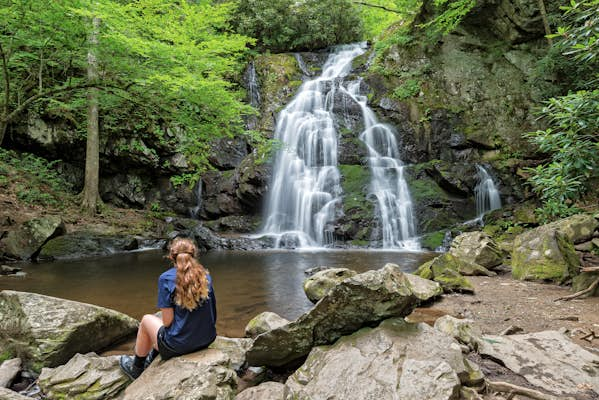
Great Smoky Mountains National Park is the most visited national park in the United States.
And, with layers of rolling hardwood landscapes, 2100 trickling waterways and a mysterious fog that looms at seemingly all hours, it isn’t hard to see why. With so much going right for it, there are still opportunities for things to go horribly wrong, usually due to a lack of preparation. As well as booking key activities in advance, here you need to be ready for the unexpected, which could mean anything from changing weather conditions to bears.
So, as you plan for your Great Smoky Mountains National Park trip, here are the top 12 things to know ahead of time.
Immerse yourself in the best experiences the world has to offer with our email newsletter delivered weekly into your inbox.
1. It’s free to enter, but not to park
Compared to some of its national park counterparts, Great Smoky Mountains National Park is a bargain break. There is no entry fee, so you can redirect that dough toward inner-park excursions or, perhaps, a donation to organizations like Friends of the Smokies that help preserve its confines. While there is no entry fee, a change in parking fees was implemented in March 2023. Whereas parking was previously free, it will cost $5 per day to park in official parking areas for visits longer than 15 minutes. Parking passes are now available online and at visitor centers with weekly ($15) and annual passes ($40) available.
2. Enter a lottery in April for the summer firefly spectacle
Leading up to your trip, perhaps you’ll hear some buzz around a firefly mating spectacle that takes place each summer. Late May through late June each year (the target dates vary), the photinus carolinus species of fireflies light up a section of the Smokies with synchronous flashes. It’s a visual spectacle like few others. To catch it, you’ll need to plan well ahead of time and get lucky. Keep an eye on the National Park Service’s website for a lottery process beginning in April. If you’re granted access, you’ll receive a parking pass to experience the flash-filled wonder near Elkmont Campground.
 Be sure to apply for a fishing license in advance of your visit © James L. Amos / Getty Images
Be sure to apply for a fishing license in advance of your visit © James L. Amos / Getty Images
3. Book your trout fishing license in advance
It can be oh-so-tempting to pull off the roads adjacent to Little Pigeon River or Little River, pull out your fishing rod and start fishing for trout. However, you need a fishing license to do that and, if you don’t have one, there can be hefty fines. So, snag one ahead of time and be cognizant of which state you are fishing in. The online route for booking licenses in Tennessee and North Carolina is the most seamless.
4. Mingus Mill is a good alternative to busy Cades Cove
The Cades Cove Loop is deservingly the most popular destination in the park. The 11-mile path provides panoramic, often fog-clad Smokies vistas, there’s a 159-site campground, a historic European settlement and a trail to Abrams Falls. With that, it can get busy and, if you’re going to experience a traffic jam in a national park, this is probably where it’ll happen.
For an equally dazzling dabble in history and tranquility, head to Mingus Mill, just north of the Oconaluftee Visitor Center on the North Carolina side. Dating back to the late 1800s, this historic mill is still operational and powered by a nearby flume. If camping is in the mix, Smokemont Campground is just three miles north of the mill with 142 sites. As with all camping spots – book your site as far in advance as possible.
5. Consider a shoulder season visit to avoid the crowds
The summer months (June through August) as well as peak foliage season (September and October) are the busiest months at Great Smoky Mountains National Park. If pleasant temperatures (highs of 65–70ºF) and smaller crowds are desired, consider the March to May time frame. In addition to less traffic, you’ll be treated to the peak wildflower bloom, too.
 The cabins at LeConte Lodge need to be booked well in advance © Martina Sliger / Shutterstock
The cabins at LeConte Lodge need to be booked well in advance © Martina Sliger / Shutterstock
6. Prepare to hike to LeConte Lodge and book months in advance
A stay at the only lodging option within the park sounds dreamy, right? Well, it is – the LeConte Lodge is a half-mile from the park’s third-highest peak, Mt LeConte. But, getting to the lodge, will require a moderately strenuous, six-plus hour hike. So, only book the lodge if you’re willing to trek 8 miles and an elevation gain of approximately 2700ft. And, you’ll want to book well in advance – the window for reservations opens months in advance and fills up quickly. The lodge is also typically closed for the winter, during the December through mid-March range.
7. Arrive early to snag trail parking and beat the crowds
The park is open 24 hours a day, 365 days a year. So, how early you arrive in the Great Smokys is up to you and, by doing so, you’re rewarded not only with more wiggle room, but parking. At some of the park’s more premium trailheads, like the Alum Cave Trail, parking lots can easily fill by 10am and, often, there are “no parking” signs dotting the nearby road shoulders. So, set that alarm early to avoid potential disappointment.
8. Bring a wetsuit for frigid water adventures
Even when summer temperatures creep into the mid-70ºFs and low-80ºFs here, the water remains cold (at around 60ºF). Sure, a splash can be super refreshing. But, if you’re planning to get knee deep while trout fishing on the Little River or have a white-water rafting excursion on the Pigeon River, bring a wetsuit. If you don’t have one, rentals are typically available with the likes of Rafting in the Smokies and Rafting Tennessee.
9. Don’t be fooled by the fog – wear sunscreen
There are more than 800 miles of trails to explore within Great Smoky Mountains National Park. For the avid hiker who wants to do as many tree-lined trails as possible or even if you’re planning a quick kayak or canoe trip on Fontana Lake, you’ll be spending time in the sun. Fog-draped landscape or not, layer up on sunscreen and reapply regularly. UV rays can penetrate the fog and clouds, so stay safe.
 There are miles of hiking trails across Great Smoky Mountains National Park © Katie Dobies / Getty Images
There are miles of hiking trails across Great Smoky Mountains National Park © Katie Dobies / Getty Images
10. Stay alert even on the most approachable of trails
There are 150 trails within the park’s confines. And, for families with young kids and casual walkers, there are plenty of totally paved, seamless spots for a hike. However, regardless of how “easy” a hike may be, corners, cliffs and your fellow hikers can prove a distraction. An example is the popular Laurel Falls trail near the Sugarlands Visitor Center. It’s a paved, 2.5-mile round-trip trail that’s nearly all asphalt and leads to multilayered waterfall bliss. As you round the corners, steep cliffs down to a trickling creek emerge out of nowhere, so you’ll want to stay alert and hold on tight to wandering little ones.
11. Do not bring your dog
Whereas dogs may be welcome on most trails in some national parks, that is not the case at Great Smoky Mountains National Park. In fact, dogs are prohibited on all trails with the exception of two. So, unless you’re planning to hit the 1.9-mile one-way Gatlinburg Trail or 1.5-mile one-way Oconaluftee River Trail, leave your furry friend at home.
12. Leave the bears, elk and wildflowers alone
Whether it’s a white-tailed deer scurrying away or – if you’re lucky to see one – a perusing black bear sifting through the leaves, keep a 50ft distance between you and the wildlife. After all, it is their home and we are just visitors. It’s also worth noting that if you decide to pick and pull at any flora – yes, including those stunning wildflowers blooming in the springtime – you could face a fine of up to $5000.



